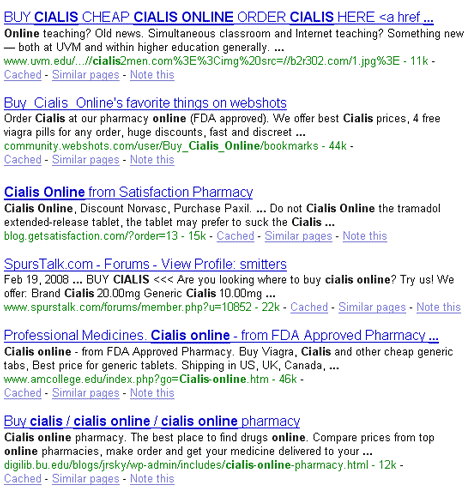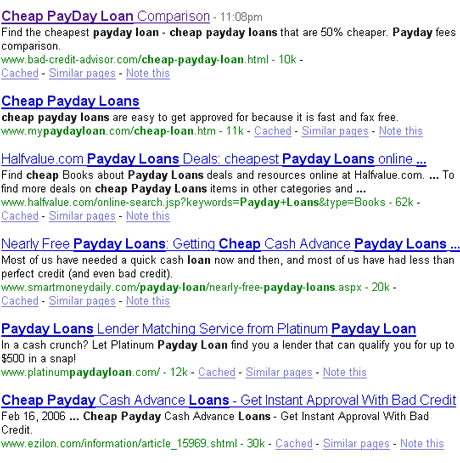
Google Spam Illuminates the Algo's Reliance on Domain Authority
Try a few searches with me...
Buy Viagra

Cialis Online

Cheap Payday Loans

viagra cialis credit card mortgage payday loan ringtones (yeah, yeah, I know... just stick with me)

There are some characteristics here that reveal a lot about Google's ranking algorithms. Here's what I take away:
- Trusted domains are excellent places to store nefarious content, because Google gives content on these domains the benefit of the doubt (and has for at least the past 3 years)
- Reversing the links on these pages via Site Explorer shows that many, low quality links (blog, comment and link injection spam) from relatively trusted domains combine with crappy link farms to produce these short term high rankings.
- EDU pages and links may not be "inherently" better able to rank, but they certainly have a high propensity to earn the kind of trust necessary to perform well.
- Google's ability to detect hidden content still isn't 100%, and high rankings can be earned by spam content and links on domains like cornucopia.org (view source and search for "viagra") and feelphones.com (same thing).
Domain trust is, in my opinion, the biggest tool Google has been able to leverage to fight spam and grow relevance. It's the reason why content on Wikipedia outperforms the same content on virtually any other domain and why barely relevant pages from trusted sites will often outperform more targeted material on smaller, new domains. This isn't just something that's visible in web spam searches, but in the normal SERPs as well.
Recently, jamersan posted a YOUmoz entry about Google's .com search results. I like to use some similar searches to find out some of the domains the search giant appears to trust most highly:
- www site:.com (which illustrates which .com websites are most relevant to "www," essentially stripping semantic intent from the query)
- www site:.org
- www site:.edu
- www site:.gov
- www site:.net
- www site:.co.uk (try it on any country, and you're likely to get a list of the most "important" domains with that TLD)
The results of these queries match up very well to the highest PageRank, most linked-to, most referenced domains on the web. If you're seeking to become a true authority online, I think this is some of the better competitive intelligence material available. These domains fit Google's profile for trust and authority extremely well.
While domain authority may seem like an unreachable goal for many small and mid-size site owners, there are some very big takeaway lessons from a dive into Google's algorithmic dependence on domain weighting:
- It's almost universally wiser to put all of your content onto a single domain, where every link earned can reinforce and bolster the ability of all content on the domain to rank better.
- Links from trusted domains may be important, but if you've already got a trusted domain, it doesn't take much external link juice for Google to consider your content relevant
- Age correlates fairly well with domain authority - there are very few domains younger than 5 years old on any of the top 100 .com/.net/.edu/etc lists
- Leveraging "rented" pages or placing relevant listings/content/links on high-trust, high-authority domains might be an excellent strategy to help achieve visibility in the short term (I don't mean spam injections, I mean legitimate placement/submission/ugc)
- Spending a lot of time in strange search results can bring a lot of extra SEO knowledge (I blame it for that 6th sense many SEOs develop about rankings over time)
Spam isn't always annoying and negative. Sometimes, we can even learn from it :)
p.s. I can't resist showing one more spam discovery off - one of the spamming sites, bad-credit-advisor.com, has a sitemeter link to this page - www.sitemeter.com/?a=stats&s=s21badcredit - which shows both the incredible effectiveness of their link manipulation campaign and just how much traffic #1 positions at Google generate for terms like "cheap payday loan" and "credit dispute letters." Checking their link profile at Yahoo! is especially interesting as well - lots of EDU, Yahoo! directory, and low quality link lists on there. I think I'm just fascinated by black hat SEO in general :)
The author's views are entirely their own (excluding the unlikely event of hypnosis) and may not always reflect the views of Moz.




Comments
Please keep your comments TAGFEE by following the community etiquette
Comments are closed. Got a burning question? Head to our Q&A section to start a new conversation.